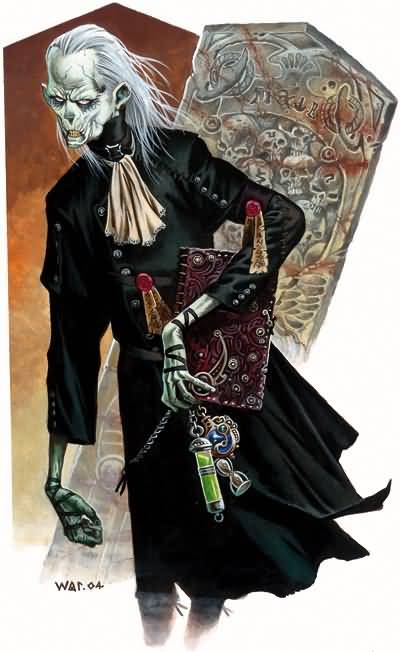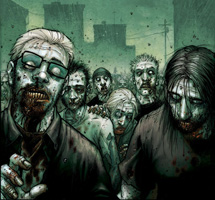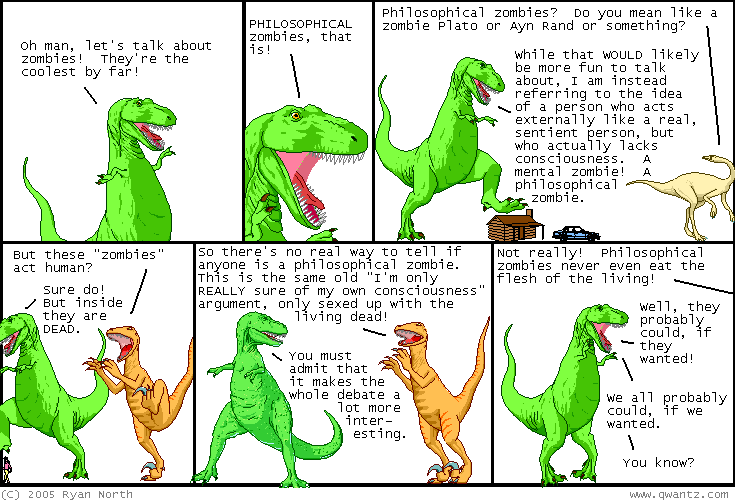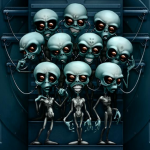
A philosophical zombie, p-zombie or p-zed is a hypothetical being that is indistinguishable from a normal human being except that it lacks conscious experience or subjective consciousness, qualia, or sentience. In this sense zombies are mere automaton, completely ‘mindless’ in the conscious sense. If you shoot a p-zombie, he cries out as if he feels pain, but he really doesn’t, because there is no consciousness there to do the feeling.
Origin: philosophy. They are found in philosophical articles on consciousness.
The notion of a philosophical zombie is mainly a thought experiment used in arguments (often called zombie arguments) in the philosophy of mind, particularly arguments against forms of physicalism, such as materialism and behaviorism.
- A behavioral zombie is behaviorally identical with humans and yet has no conscious experience.
- A neurological zombie has a human brain and is otherwise physically identical to humans; nevertheless, it has no conscious experience.
- A soulless zombie lacks a soul but is otherwise indistinguishible from an ordinary person; the concept is used to question what, if anything, the soul does.
Zombie arguments are generally used against claims of physicalism, the position that everything has a physical property, and they support a form of dualism, though not every dualist believes in p-zombies. In the p-zombie cases, the dualism they support is that there are two types of substances in the world: physical substances and mental substances.
According to physicalism, the physical facts determine all other facts; it follows that, since all the facts about a p-zombie are fixed by the physical facts, and these facts are the same for the p-zombie and for the normal conscious human from which it cannot be physically distinguished, physicalism must hold that p-zombies are not possible, or that p-zombies are the same as normal humans.
According to behaviorism, mental states exist solely in terms of behavior: belief, desire, thought, consciousness, and so on, are simply certain kinds of behavior or tendencies towards behaviors. One might invoke the notion of a p-zombie that is behaviorally indistinguishable from a normal human being, but that lacks conscious experiences. According to the behaviorist, such a being is not logically possible, since consciousness is defined in terms of behavior. So an appeal to the intuition that a p-zombie so described is possible furnishes an argument that behaviorism is false. Behaviorists tend to respond to this that a p-zombie is not possible and so the theory that one might exist is false.

However, the zombie argument against physicalism in general was most famously developed in detail by David Chalmers in The Conscious Mind (1996). According to Chalmers, one can coherently conceive of an entire zombie world: a world physically indiscernible from our world, but entirely lacking conscious experience. In such a world, the counterpart of every being that is conscious in our world would be a p-zombie.
Chalmers says that the logical possibility of zombies is one way of illustrating that there is no logical relationship between physical constructs and consciousness. Of course some philosophers find the logical possibility of zombies to be ludicrous, and some scientists wonder whether anything really important can be drawn from something that is merely conceivable but not known to exist. Chalmers believes that most arguments using zombies “can actually be rephrased in a zombie-free way,” to allow people to consider the arguments on their own merits with or without the zombies, but zombies allow the philosopher to provide “a vivid and provocative illustration.”
References and further reading
- Chalmers, David. 1995. “Facing Up to the Problem of Consciousness”, Journal of Consciousness Studies, vol. 2, no. 3, pp. 200–219. Online PDF
- Chalmers, David. 1996. The Conscious Mind: In Search of a Fundamental Theory, New York and Oxford: Oxford University Press. Hardcover: ISBN 0-19-511789-1, paperback: ISBN 0-19-510553-2
- Chalmers, David. 2003. “Consciousness and its Place in Nature”, in the Blackwell Guide to the Philosophy of Mind, S. Stich and F. Warfield (eds.), Blackwell. Also in Philosophy of Mind: Classical and Contemporary Readings, D. Chalmers (ed.), Oxford, 2002. ISBN 0-19-514581-X, Online PDF
- Chalmers, David. 2004. “Imagination, Indexicality, and Intensions”, Philosophy and Phenomenological Research, vol. 68, no. 1. Online text
- Dennett, Daniel. 1995. “The Unimagined Preposterousness of Zombies”, Journal of Consciousness Studies, vol. 2, no. 4, pp. 322–326. Online abstract
- Dennett, Daniel. 1999. “The Zombic Hunch: Extinction of an Intuition?”, Royal Institute of Philosophy Millennial Lecture. Online text
- Kirk, Robert. 1974. “Sentience and Behaviour”, Mind, vol. 83, pp. 43–60.
- Kripke, Saul. 1972. “Naming and Necessity”, in Semantics of Natural Language, ed. by D. Davidson and G. Harman, Dordrecht, Holland: Reidel, pp. 253–355. (Published as a book in 1980, Harvard University Press.)
- Nagel, Thomas. 1970. “Armstrong on the Mind”, Philosophical Review, vol. 79, pp. 394–403.
- Nagel, Thomas. 1974. “What is it Like to Be a Bat?” Philosophical Review, vol. 83, pp. 435–450.
- Thomas, N.J.T. 1998. “Zombie Killer”, in S.R. Hameroff, A.W. Kaszniak, & A.C. Scott (eds.), Toward a Science of Consciousness II: The Second Tucson Discussions and Debates (pp. 171–177), Cambridge, MA: MIT Press. Online
- Yablo, Stephen. 2000. “Textbook Kripkeanism and the Open Texture of Concepts”, Pacific Philosophical Quarterly, vol. 81, pp. 98–122. Online text
External links
- Online papers on philosophical zombies, by various authors, compiled by David Chalmers.
- “Philosophical zombie” article in the Stanford Encyclopedia of Philosophy
- Skepdic entry on p-zombies









